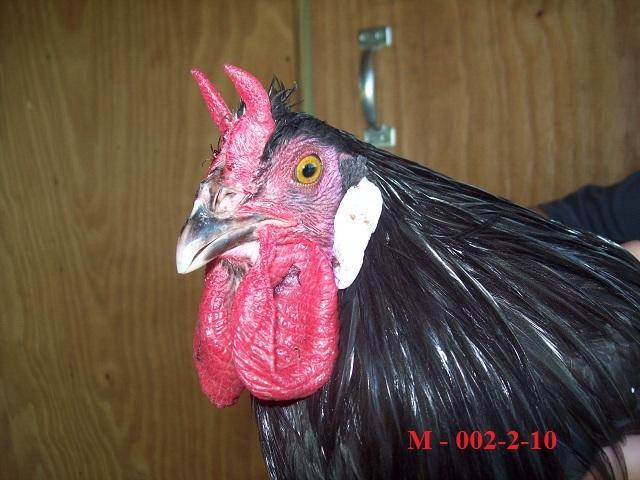WoW! This is fantastic. I am very glad to read others' enthusiasm for this breed. I used to raise it but decided I had too many breeds. I reduced down to two breeds, and this was the only one I regretted. In fact, I currently have an order out with Sand Hill to possibly recommence with them.
La Fleche are great. They are old-school chickens and have the qualities that one of my poultry buddies would call real chickens. If I may:
They are flighty. This is an essential characteristic of breeds expected to do well in a semi-wild, i.e. free-range, situation. Considering their long history and what would have been available for infrastructure in the early days of their existence (no wire-netting, 2x4's etc...), it is fairly safe to assume that for many generations they were expected to free range and not die in the process, which anyone who free ranges long enough today will attest is a challenge (predators are everywhere as we all know).
Flightiness is usually triggered via action from above. Real chickens are hot-wired to fear anything above them. Hence, when you're in their pen throwing scratch and crouching down they'll be about your feet, but once you stand up they're nervous. Depending on the amount of space they're in (how trapped they sense themselves to be) they might resort to the one option to stay alive: fly. This is a natural, biological, and good behavior. By good I mean that, if I were to have a group of La Fleche and Australorps out free-ranging and a Goshawk were to swoop down, my money's on the La Fleche. It has become commonplace to disparage flightiness, but it really depends on the owners management practices. If the birds are in a covered pen almost exclusively with only supervised free ranging, well, then it doesn't matter. However, if one is planning on opening the doors to the field before work, leaving, and then coming home at the end of the day to find the flock in good condition, well, a plymouth rock is a sitting duck. A La fleche is a far surer bet.
As far as mean cockbirds go. I have never had any La Fleche go mean. THis opens up a conversation though, and a little pseudo-theory that has been running through my head. A blogger back a few pages wondered whether or not it was a trait from out-crossing to Minorcas. I'd take it a step further. We have raised for several years now Dorkings and Anconas. They are very different breeds temperment-wise. I have never had a Dorking go mean and only one Ancona male has ever gone mean at our farm. I have however had mean Speckled Sussex, Wyandottes, Plymouth Rocks...and God save us from RI Reds and NH's. The Dorking and Anconas are old-school, pure-bred foundational breeds. The others are relatively new breeds developed via the crossing of two or more other breeds. The Reds are infused with fighting-cock blood. This is an extremely loose theory, in fact I'd really only call it a vague notion, but I wonder whether or not in the crossing there is not a sort of temperment loosing, rendering them more touchy and that would then necessitate strong culling to remove poor temperment. This would make it like any other loosed trait originating from outcrossing. This is not, of course, to imply that one cannot have a mean Dorking. I wonder, though, how common it is in comparing foundational breeds with composite breeds.
As for meat qualities, having eaten many La Fleche, I can attest to their excellent meat quality. Having eaten 17 different breeds, I would rank the Dorking with the Houdan as being truly outstanding. By this, I reference quality of meat, though, and not size. La Fleche are way under proportioned. You can see it in one of the recent photos of your La Fleche cockerel. His breast in too close to his body. It is supposed to be much deeper and fuller. Indeed, La Fleche are meant to be used for capon--that's one heck of a raost. I don't say this, though, to disparage your cockerel or tempt you to cull him. Indeed, La Fleche take a long time to mature, and his breast might open up significantly. Still, I'd be HAPPILY suprised to find a single truly fullbreasted meat-bred La Fleche in the entire country. Of course, though, with a rare breed such as this, one must expect to have to do a whole heck of a lot of work, and that's one of the aspects that needs attention if this breed is going to be the bird of the 1874 standard. Possible, I do believe so, but I think it is going to necessitate a lot of patience. GO TEAM!
White La Fleche? Oiweh! I noticed them available this year in the Sand Hill catalogue, and it made me sad. True black La Fleche are so incredibly rare, so very close to being genetically destroyed world wide for the sheer sake of outstandingly low numbers that to ask them to compete with some color sport is deeply unwise. La Fleche are black--period. Fadism is ALWAYS destructive to a breed. Let's first save good black La Fleche from extinction and return them to numbers which guarantee a sound genetic base, and then we can commence trying to figure out how to create some lavender La Fleche or what have you. Creating colors is easy. Creating strong birds? Not so much. Let's talk about White La Fleche twenty years from now. By then, La Fleche will either be extinct or in good standing.
My heartiest congratulations to you for your obviously attentive work with this fantastic breed. I wish for your efforts many blessings. In ten years may in be said of your stock that they are the very best in the country!







